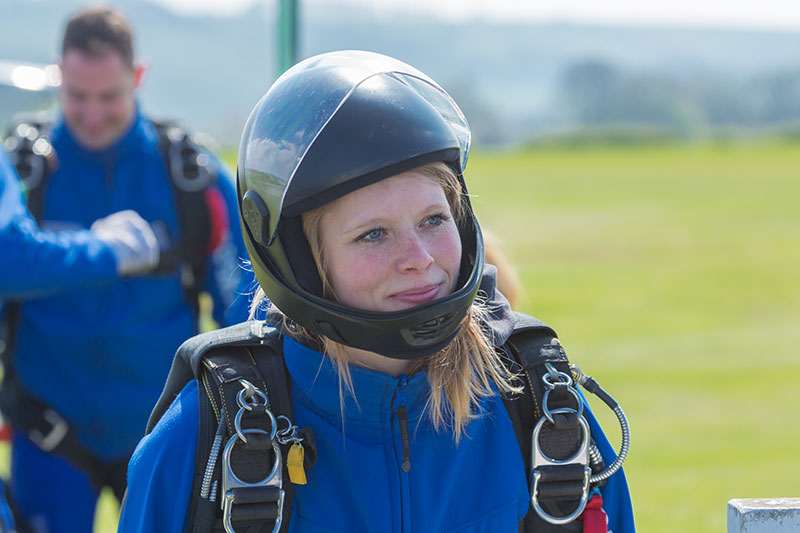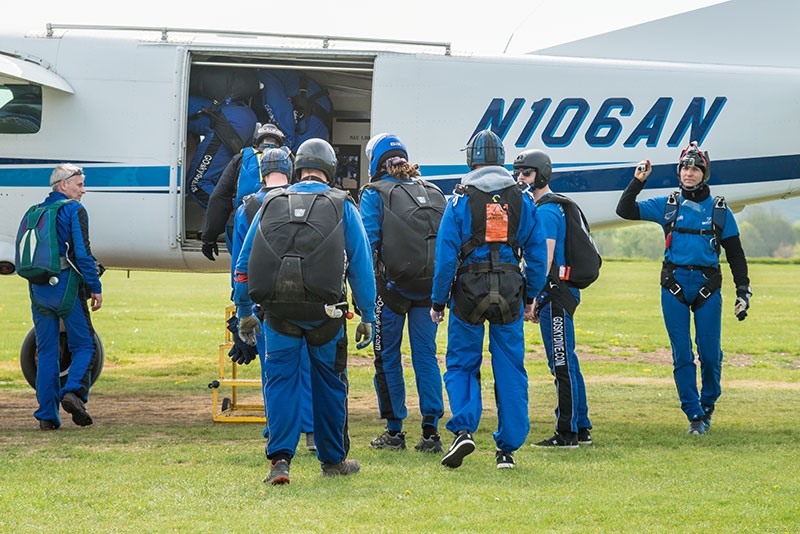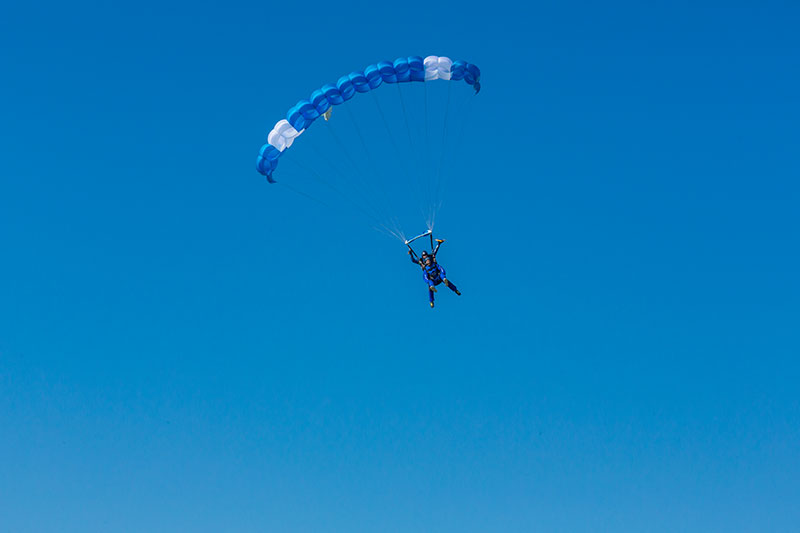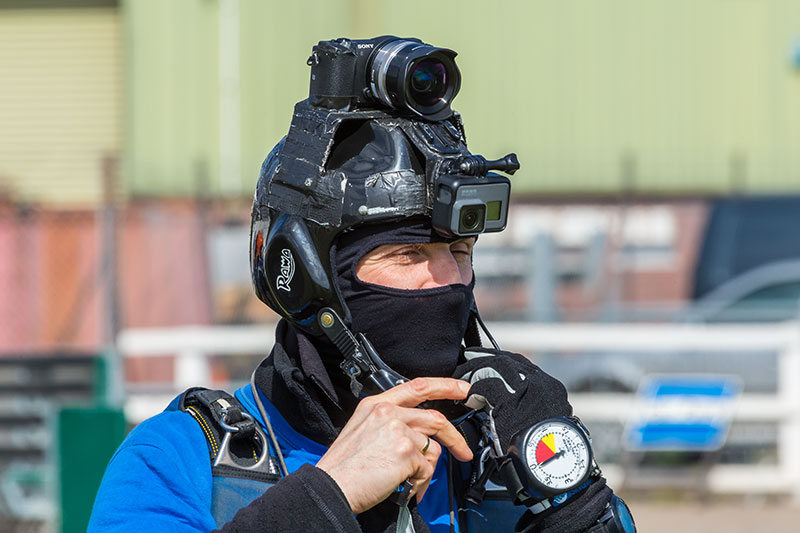About our AFF Program
Accelerated freefall (AFF) is a training system which takes you from your first jump to being a qualified skydiver. You need no previous experience to undergo this type of training. During the ground training you will be taught to exit the aircraft, adopt the freefall position, read your altimeter, open and steer your parachute, land safely and deal with any emergencies that arise either in the aircraft or under the parachute.. Your physical skills will be assessed throughout the day, which ends with a written test.
You will make your first jump from 12,000 feet with two instructors holding you during the freefall phase, which lasts 30-40 seconds. During subsequent jumps, and as your skills develop, this will reduce to one instructor. After a minimum of eight jumps you will be skydiving by yourself. A minimum of eighteen jumps is required to gain your ‘A’ licence.
Speak to one of our team to discuss the AFF program at Headcorn.

Training Dates
We will be running training and one jump courses on the following dates. (The first jump is the day following the training).
- 25th April
- 30th May
- 4th July
- 1st August
- 5th September
These courses are for people who do not want to commit to all the AFF levels in one go. Further jumps are available and can be discussed on the training day or after the first jump.
A £100 booking fee is required to reserve a place on these dates.
We will be running dedicated weeklong courses starting on the following dates
- 28th April
- 2nd June
- 7th July
- 4th August
- 8th September
These courses are for people who are committed to becoming qualified skydivers and want to complete the course in one intensive week and gain a licence asap.
A £250 fee is required to reserve a place on these dates.
If you wish to book, then please email jane@goskydive.com with your preferred date.

Accelerated Freefall Progression
Having completed an AFF training course and first jump (level 1), it is possible to continue jumping and to gain a licence after a minimum of eighteen jumps. Progression jumps are as follows.
- Two jumps with two instructors demonstrating awareness and control from 12,000 feet (levels 2 and 3)
- Two jumps with one instructor demonstrating turns from 12,000 feet (levels 4 and 5)
- Two jumps with one instructor demonstrating loops, tracking and turns from 12,000 feet (levels 6 and 7)
- One solo jump deploying your parachute within ten seconds of exit from 5,000 feet (level 8)
- Ten solo jumps consolidating your skills from 12,000 feet (consolidation jumps)
Before starting any training course, the following memberships must be paid for.
- £35 Club membership.
- £25.83 Temporary (one month) or £145.57 full British Skydiving membership.

Breakdown of jump costs
| Description | Cost |
|---|---|
| Training | £100 |
| Jumps with two instructors (levels 1, 2 and 3) per jump | £265 |
| Jumps with one instructor (levels 4 to 7) per jump | £150 |
| Solo jumps including level 8 per jump | £50 |
Total jump costs of qualifying
| Quantity | Description | Cost |
|---|---|---|
| 1 x | Training | £100 |
| 3 x | Jumps with two instructors (levels 1, 2 and 3) | £795 |
| 4 x | Jumps with one instructor (levels 4 to 7) | £600 |
| 11 x | Solo jumps including level 8 | £550 |
| Total minimum jump costs of qualifying for a BS ‘A’ Licence | £2045 | |
Please note the following costs are not included. £265 Repeating a level with 2 instructors, £150 Repeating a level with 1 instructor, £50 Repeating level 8 or any solo jump, £15 ‘A’ licence fee, £50 Retraining after 3 months and before 6 months, £100 Retraining after 6 months and before 12 months

Want to know more about our AFF Program
Below are some frequently asked questions
AFF training is the start of a progression system that leads on to you gaining a British Skydiving (BS) ‘A’ licence. This qualification is recognised throughout the world. An ‘A’ licence allows you make jumps without supervision from an instructor and can lead onto you gaining further and higher qualifications so you can jump in formation with other people, enter competitions, make display jumps, and become an instructor and many more exciting things.
At Headcorn Airfield right in the heart of Kent with incredible views of the Southeast corner of England, the south coast of Essex and the northern coast of France.
The total cost of the training course including an AFF level 1 jump is £365. The next 7 levels cost a total of £1180 which includes the cost of hiring your equipment, training fees and packing.
The sport is governed by very strict rules and regulations laid down by British Skydiving (BS).
For safety reasons our general weight limit fully clothed is 86kg (13½ stone). However, this limit is proportional to height. A lower weight limit of 80kg (12st 9lbs) applies to someone who is 1.57m (5’ 2”) or shorter. However, if you are 1.72m (5′ 7″) or taller; our absolute limit is 92kg (14½ stone). You may be weighed during registration. We reserve the right to refuse your jump if you exceed these limits. Please refer to the table below for suggested maximum height to weight ratios. If you exceed these limits but are under the limits published above we will still accept you, but you are accepting a greater risk of injury. BS form 115C refers.
| Height Feet | Height Metres | Weight Stones | Weight KG |
|---|---|---|---|
| 4’ 10” | 1.47 | 9.5 | 60.32 |
| 4’ 11” | 1.49 | 9.9 | 62.86 |
| 5’ 0” | 1.52 | 10 | 63.50 |
| 5’ 1” | 1.55 | 10.5 | 66.67 |
| 5’ 2” | 1.57 | 10.10 | 68.03 |
| 5’ 3” | 1.60 | 11.1 | 70.30 |
| 5’ 4” | 1.62 | 11.6 | 72.57 |
| 5’ 5” | 1.65 | 11.11 | 74.84 |
| 5’ 6” | 1.67 | 12.2 | 77.11 |
| 5’ 7” | 1.70 | 12.7 | 79.37 |
| 5’ 8” | 1.72 | 12.12 | 81.64 |
| 5’ 9” | 1.75 | 13.3 | 83.91 |
| 5’ 10” | 1.77 | 13.9 | 86.63 |
| 5’ 11” | 1.80 | 14.1 | 88.90 |
| 6’ 0” + | 1.83 + | 14.7 | 92.07 |
We have weight limits for safety and for several reasons.
Firstly, we have an all-up weight for the parachutes we use which includes the weight of you and all the parachute equipment. Secondly, we cannot exceed a wing loading of 0.8lbs per square foot of canopy for novices. To calculate this, we have to divide your weight and all the weight of the equipment into the size of the parachute. Exceeding this limit means that the parachute has more performance and therefore becomes unsuitable for a beginner. Thirdly, we must consider weight and centre of gravity issues in the aircraft. We work on an average exit weight (that is you, your clothes and the weight of the equipment) and large variations from this can unbalance the aircraft. Lastly, statistics show that someone who exceeds the weight limit for their height is at a much greater risk of injury. We will assess your risk during your training day and if we feel it is too great, we will refuse you the jump. You must be at least 16 years of age. Under 18’s requires parental consent. Everyone must sign a medical declaration prior to starting training. This form can be viewed on the website. If you cannot sign it as you have one of the listed medical conditions, you may still be able to jump by seeking qualified medical advice from your doctor who will assess your risk. The upper age limit for starting training is 54.
During the training day you will be taught to exit the aircraft, adopt the freefall position, read your altimeter, open your parachute, steer to the landing area, land safely and deal with any emergencies that may arise. Your physical skills will be assessed throughout the day, which ends with a written test. The following day you will make your first jump from 12,000 feet with two instructors holding onto you throughout the freefall phase. Once under the parachute you are on your own. You can then make further jumps and as your skills develop you will progress
- Two jumps with two instructors demonstrating awareness and control from 12,000 feet (levels 2 and 3)
- Two jumps with one instructor demonstrating turns from 12,000 feet (levels 4 and 5)
- Two jumps with one instructor demonstrating back loops, tracking, and turns from 12,000 feet (levels 6 and 7)
- One solo jump deploying your parachute within ten seconds of exit from 5,000 feet (level 8)
- Nine solo jumps consolidating your skills from 12,000 feet (consolidation jumps)
- One qualifying jump from 8,000 feet (consolidation jump)
Jumping shouldn’t be a chore and you should want to jump as much as possible. In order to progress in the sport, you must jump at least 2 or 3 times a month. If you leave longer gaps, then you will need to complete a period of re-training at additional costs and you will have to repeat jumps. Gaining a qualification in skydiving requires patience and many hours spent at the airfield.
Assuming you qualify in the minimum number of jumps, the total cost, for training and flight tickets, is £2045.
Parachuting is a weather dependent sport. The conditions we require for you to be able to jump are good horizontal visibility, no solid cloud between the landing area and the exit point of the aircraft and wind no more than 15 knots.
Once you have trained you must book in to jump with us. You must arrive early as you will need to complete a period of revision training every day prior to jumping. We are open Wednesday to Sunday, and you will need to be here for 8am. It is possible to complete 3 or 4 jumps on any one day but patience is required and you need to be at the centre for most of the day to achieve this.
A £100 non-refundable deposit is required to book onto a training course. Check the website for availability. These courses are run between April and October. Training courses are not affected by the weather. The balance of £265 for the first jump, a £35 club membership fee and £25.83 for a one-month temporary £145.57 for a full British Skydiving membership must be paid before training commences.